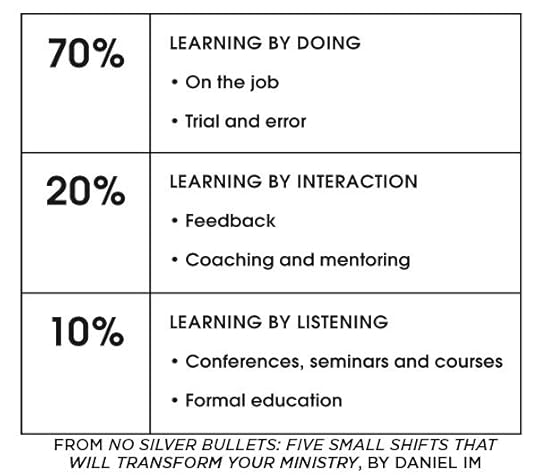Daniel Im's Blog, page 15
February 27, 2018
Want to Multiply Your Church? Focus on Leadership Development

Churches that multiply do not see their volunteers as hirelings to carry out grunt work so that the pastors can do the real work of ministry.
Churches that multiply live out Ephesians 4:11–13 and believe that every member is a minister.
This is because leadership development is not just about teaching people leadership principles, or giving church members a place to serve. Leadership development is about helping every member discover their God giving calling, grow in their skills, and develop their competencies so that they can continue to grow in their kingdom impact.
Churches that multiply do not see their volunteers as hirelings to carry out grunt work.
Click To Tweet
For example, while some churches may just be glad to find nursery workers to fill an empty spot, churches that multiply place each nursery worker on a development path, where that volunteer is not only serving, but also growing in their character and competencies.
In other words, being a nursery worker is not the end; it’s rather the means to maturity in Christ and the development of one’s leadership skills.
In Multiplication Today, Movements Tomorrow: Practices, Barriers, and an Ecosystem, Ed Stetzer and I outline the practices of churches that multiply based on our State of Church Planting Research with NewChurches.com and LifeWay Research.
A commitment to leadership development was one of the six practices that multiplying churches lived out and embodied.
According to our research, churches that focus on leadership development are not only being biblically faithful in living out Ephesians 4:11–13, but they are fruitfully experiencing more commitments to Christ, reaching financial self-sufficiency faster, and more than likely multiplying within their first five years of existence.
In addition, our research on leadership development revealed the following:
Church planters that mentored leaders of other new churches had a higher average worship attendance
Church planters who participated in, at least, a month-long leadership training course on church planting also experienced a higher average worship attendance
Church plants who had a leadership development plan for their membership saw a higher number of decisions made for Christ
Church plants who had a leadership development plan for their membership also became financially self-sufficient at a quicker rate
Multiplying churches are committed to leadership development.
Click To Tweet
There’s nothing in our research here that surprises us, given that we believe maturity generally leads to depth, width, reproduction, and multiplication. But maturity doesn’t happen haphazardly—it requires intentionality. While I don’t think anyone will deny that leadership matters, what we are trying to point out is that developing a plan to develop leaders matters greatly!
It’s the difference between addition and multiplication.
So don’t wait until you get larger or more complex to focus on developing leaders. Make this a part of your DNA and culture from day one.

February 20, 2018
Top Quotes on Counterfeit Gods by Timothy Keller
As many of you know, this year I’ve committed to reading/listening to as much of Timothy J. Keller as possible (click here to learn more about the books I’m reading/listening to and why).
I likely won’t do this for every Keller book I read/listen to, but Counterfeit Gods: The Empty Promises of Money, Sex, and Power, and the Only Hope that Matters was so incredibly rich, that for personal learning purposes, I wanted to revisit the book and pull out the quotes that punched me in the face. On a few of them, I’ll add some commentary.
Caveat: Since I listened to the book; instead of reading it, the following quotes might not match the exact wording, punctuation, and phrasing in the book.
“The incomplete joys of this world will never satisfy the human heart.”
“An idol is something we cannot live without. We must have it. Therefore it drives us to break rules we once honored to harm others, even ourselves, in order to get it.”
“Anything in life can serve as an idol, or a counterfeit god.”
“Anything can serve as a counterfeit god, especially the very best things in life.”
“An idol is anything more important to you than God. Anything that absorbs your heart and imagination more than God. Anything you seek to give you what only God can give. Anything that is so central and essential to your life, that should lose it, your life would feel hardly worth living.”
“An idol is anything that absorbs your heart and imagination more than God.”
Click To Tweet
“If I have that, then I will feel like my life has meaning. Then I’ll know I have value. And I’ll feel significant and secure.”
The “that,” which he is referring to are the idols in our lives
“The Bible uses three basic metaphors to talk about how people relate to the idols of their hearts: they love idols, trust idols, and obey idols.”
“God should be our true spouse, but when we desire and delight in other things other than God, we commit spiritual adultery.”
“Idols give us a sense of being in control and we can locate them by looking at our nightmares: What do we fear the most? What if we lost it would make life not worth living?”
“Idols control us since we feel like we must have them or life is meaningless.”
“Idols control us since we feel like we must have them or life is meaningless.”
Click To Tweet
“Whatever controls us is our Lord. The person who seeks power is controlled by power. The person who seeks acceptance is controlled by the people he or she wants to please. We do not control ourselves, we are controlled by the lord of our lives.”
“The only way to free ourselves from the destructive influence of counterfeit gods is to turn back to the true one, the living God….he’s the only one who if you find him, can truly fulfill you, and if you fail him, can truly forgive you.”
“The most painful times in our lives are times in which our Isaacs, or idols, are being threatened or removed.”
“You don’t realize Jesus is all you need until Jesus is all you have.”
“No person, not even the best one can give your soul all it needs…this cosmic disappointment and disillusionment is there in all of life, but we especially feel it in the things in which we set our hopes. When you finally realize this, there are four things you can do: You can blame the things that are disappointing you and try to move on to better ones (that’s the way of continued idolatry and spiritual addiction), you can blame yourself and beat yourself (that’s the way of self loathing and shame), you can blame the world (that’s how you get hard, cynical, and empty), or you can reorient the entire focus of your life on God.
“No person, not even the best one can give your soul all it needs.”
Click To Tweet
“Jesus warns people far more often about greed than about sex, yet almost no one thinks they’re guilty of it. Therefore, we should all begin with the working hypothesis that this could easily be a problem for me. If greed hides itself so deeply, no one should be confident that it’s not a problem for them.”
“Have we received more of God’s revelation, truth, and grace than the Old Testament believers, or less? Are we more debtors to grace than they were, or less? Did Jesus tithe his life and blood to save us, or did he give it all? Tithing is a minimum standard for Christian believers. We certainly wouldn’t want to be in a position of giving less of our income than those who had so much less of an understanding of what God did to save them.”
Wow…what reasoning regarding giving and tithing.
“Counterfeit gods come in structures…sin in our hearts affects our basic motivational drives. Some people are strongly motivated by influence and power, while others are motivated by approval or appreciation. Some want emotional and physical comfort than anything else. Others want security and the control of their environment. People with the deep idol of power, do not mind being unpopular to gain influence. People who are most motivated by approval are the opposite. They’ll gladly lose power and control as long as everyone thinks well of them. Each deep idol, power, approval, comfort or control generates a different set of fears and hopes. Surface idols are things like money, spouse, children, through which our deep idols seek fulfillment. We’re often superficial in the analysis of our idol structures, for example money can be a surface idol that serves to satisfy more foundational influences. Some people want lots of money as a way to control their world and life, and such people usually don’t spend much money and they live very modestly. They keep it all safely saved and invested so that they can feel completely save in the world. Others want money for access to social circles and to make themselves beautiful and attractive. These people do spend their money on themselves in lavish ways. Other people want money because it gives them so much power over others. In every case, money functions as an idol, and yet because of various deep idols it results in very different patterns of behavior. The person using money to serve a deep idol of control will often feel superior to others and use money to obtain power or social approval. In every case however, money idolatry slaves and distorts lives.”
Wow…just wow…the insight in this paragraph is killer.
“Surface idols are things through which our deep idols seek fulfillment.”
Click To Tweet
“There’s only one way to change at the heart level…and that’s through the gospel.”
“Achievement is the alcohol of our time. These days, the best people don’t abuse alcohol…they abuse their lives.” – Mary Bell (a counselor of high performing executives)
“One sign that you’ve made success an idol is the false sense of security it brings. The poor and the marginalized expect suffering. They know that life on this earth is nasty, brutish, and short. Successful people are much more shocked and overwhelmed by troubles.”
I’ve often heard people from the upper echelon say, “Life isn’t supposed to be this way” when they face tragedy. I have never heard this language among the working class and poor. This false sense of security comes from deifying our achievement and expecting it to keep us safe from the troubles of life when only god can.
If your success is more than just success to you, if it’s the measure of your value and worth, then accomplishment in one limited area of your life will make you believe that you have expertise in all others. This of course, leads to all kinds of bad choices and decisions. This distorted view of yourself is part of the blindness to reality that the Bible says always accompanies idolatry (Psalm 135:15-18; Ezek 36:22-36).
“The main sign that we are into success idolatry is that we find that we cannot maintain our self confidence in life unless we remain at the top of our chosen field.”
“I don’t believe the economic motive and the erotic motive account for everything that goes on in the world. It’s a lust…a longing to be inside, [which] takes many forms…You want…the delicious knowledge that just we four or five—we are the people who (really) know…As long as you are governed by that desire you will never be satisfied. Until you conquer the fear of being an outsider, an outsider you will remain…” – C.S. Lewis
“I don’t believe the economic motive and the erotic motive account for everything that goes on in…
Click To Tweet
“Success can’t deliver the satisfaction we’re looking for.”
“The secret to change is to identify and dismantle the counterfeit gods of your heart. It is impossible to understand a culture without discerning its idols.”
“If you ask for something that you don’t get…you may become sad and disappointed, then you go on. Those are not your functional masters. But when you pray and hope for something and you don’t get it and you respond with explosive anger or deep despair, then you may have found your real god.”
“What are you looking to in order to justify yourself? Whatever it is, is a counterfeit god. And to make a change in your life, you must identify it and reject it as such.”
“You may know about the love of Christ with your head, but not your heart. How can that be remedied? This takes spiritual disciplines.”
“Spiritual disciplines are forms of worship. And it is worship that is the final way to replace the idols of your heart. You can’t just get relief by figuring out your idols intellectually. You have to actually get the peace that Jesus gives…and that only comes when you worship. analysis can help you discover truths, but then you have to pray them into your heart. That takes time.”
“It is worship that is the final way to replace the idols of your heart.”
Click To Tweet
Pick up a copy of Counterfeit Gods: The Empty Promises of Money, Sex, and Power, and the Only Hope that Matters today. Seriously. You won’t regret it. It’s that good.

February 13, 2018
The Lost Art of People Watching…and Why it Still Matters

I used to be good at people watching.
Now I never called it that because it was never a thing that people did intentionally.
Before smart phones, if you were going to get together with your friends or family, you would just set a time and a place and expect people to be there. If you got there before everyone else, you wouldn’t take your phone out and check Facebook, Twitter, or Instagram, since that didn’t exist (I know, it is hard to remember that there was even such a time).
Instead, you just looked around.
If someone were doing something out of the ordinary, you would notice. If a mother were scolding her child for throwing a fit in public, you would look in that direction or slightly to the side, so as to not give the impression that you were eavesdropping. If a couple were on a date, you would try to guess where they were going, the status of their relationship, and if they were a good fit.
With the advent of smart phones and social media, you might have thought that people watching has turned into a lost art. Not so! People watching has merely moved from the physical sphere to the digital space.
People watching has merely moved from the physical sphere to the digital space.
Click To Tweet
It has become incredibly easy to watch what others are doing by creeping on their social media profiles. Let alone the fact that there are some apps that will tell you where someone is—moment by moment!
With the increasing digitization of people watching, there are many that are advocating that we go back to the ways-of-old.
Believe it or not, you can even download a nine-step guide to learn how to people watch.
Pathetic? Perhaps.
Fascinating? Most definitely.
There are even websites where you can submit conversations you overheard while people watching!
A couple years ago, my wife and I celebrated our tenth year anniversary by taking a trip to New York.
We’ve lived in big cities like this before, but for some reason, New York just seemed more congested than we last recollected. It was fascinating to meet and pass by the different kinds of people who called New York home.
When we were walking through China town in Queens, a Chinese lady with a scarf over her head scattered bowlfuls of seed on the ground—at which dozens of pigeons descended, just like children do when a piñata bursts open. My wife and I began asking one another questions like:
“Why would she do that?”
“I wonder if it’s because of her religion?”
“Or, perhaps it’s good luck if a bird poops on her?”
Later on, when walking through Times Square during broad daylight, we noticed that there were several people in character costumes, like princesses and superheroes, wanting to have their picture taken with others for a few dollars. Our people watching continued with questions and comments like:
“I wonder who is in those costumes?”
“They must be sweating in there!”
“I wonder how much they actually make in a day?”
One evening when it was raining lightly, we walked by the Port Authority bus terminal and noticed many Middle Eastern families with small children, European couples, homeless panhandlers, and teenagers eating pizza by the slice. You can guess the conversation that ensued as we continued walking toward the Broadway show that we had tickets for…
The fact is, no one is the same. And though we all have unique stories, we all share the same need—a need for the gospel.
Everyone needs the gospel…no matter who they are, what they’ve done, or what they look like.
Click To Tweet
Though everyone is loved by God, we don’t all live in light of this truth. Instead of putting our hope in the only one who will never let us down, and who gave up everything so that we would experience true life as he intended it and designed it, many of us put our hope and redemption in something else…in something less…
For some, it’s family values. For others, it’s work, wealth, or fame. And still for some it’s religion that’s all about doing, works, and self-righteousness.
In light of that, can you name one or two friends, neighbors, or co-workers who are far from God? What do they put their hope in? What do they see as their redemption and purpose in life?
What do you think would happen if you stopped people watching and instead began people engaging?
Creating margin in your life so that you can spend time with them? So that God can work in and through you?
To learn more, check out these two articles:
5 Ways to Find Your Way Back to God
How to Create a Missional Culture at Your Church (BLESS Pocket Guide)
February 6, 2018
A New Chapter and Season

Once Christina and I had Victoria, our first child, the way we went about life and ministry changed dramatically.
Instead of being on the front lines doing ministry together, Christina took a back seat. Not a back seat in regards to importance, but a back seat in regards to visibility and role.
So over the last year, a regular conversation that we would have while praying and Sabbathing together had been, “What are you going to do when the kids all go to school?”
“Are you going to go back to social work? To counseling? Back to school? Or start something new?”
While we still don’t have that fully figured out (and I think that’s okay), there is one thing that we’ve decided to do…and do together.
Start a podcast!!
We’re not moving, we’re not having another baby, and I don’t have a new job. But we are entering into a new chapter and season of our lives, marriage, and ministry.
Over the past 11 years of marriage, our home and dinner table have been a consistent place of encouragement and fun with other couples and families.
Even before we were married, we dreamed about our future home being a place where others would feel loved, appreciated, and comfortable to be themselves—flaws and all. This desire was rooted in our love for God and is actually summed up in the scripture passage engraved on the inside of our wedding bands, Romans 12:9-21!
So we’ve decided to start a podcast for couples and parents where we would take topics and break them down into practical and implementable principles for your life, marriage, and family. It’s called the IMbetween Podcast.
Topics include:
Double chins and getting older
Money saving hacks
How to not hate your in-laws
Extra curricular activities and slowing down
Keeping the romance alive
The new rules of dating and why it matters
…and more!
So we’d be honored if you would subscribe and listen to our weekly podcast (maybe even with your spouse). And if you don’t mind, sharing this podcast with others and an honest rating and review on Apple Podcasts would help A TON in getting the word out.
Here are four easy links to get started:
Apple Podcasts
Stitcher
Google Play
You can learn more about the podcast here
January 30, 2018
What Is My Calling as a Christian?

What you do for work is not your calling.
Oftentimes, we confuse our calling with what we do to get paid—with that perfect job or that ideal career. But what if I were to tell you that your primary calling is not what you do to get paid? But that it’s actually something that transcends what you do to get a paycheck?
If you’re a pastor or church leader, there was a point in time (and in some contexts you might be still working on it) where the main goal was to help your church understand the Reformation doctrine of “the priesthood of all believers.”
I believe that today we need to make an even further shift: from priest to missionary.
It’s one thing to help our church members understand that they are the church and that it’s the role of the pastor to equip the saints to do the work of ministry, rather than do it for them (Eph. 4:11–12). So in this sense, every member is a minister or every member is a priest. And in this way, the concept of doing ministry is often seen as an internal matter of caring for the flock, and helping them mature.
But today, in order to reach the nations, we must move beyond priesthood and call people to see themselves as missionaries—the “sent out” ones.
Just imagine if everyone in your church saw their primary calling as being missionaries—wherever they live, work, and play—and their secondary calling as being whatever they do to make a paycheck?
Being a missionary is your primary calling. Your secondary calling is whatever you do to get a…
Click To Tweet
I’m not talking about training up overseas missionaries here. Nor am I advocating that you ask everyone to quit their job and become full-time local pastors.
I’m using the word missionary as a noun referring to people who see their primary calling as being sent on God’s mission, rather than their own.
I’m specifically talking about helping ordinary people understand that all of their life is about mission.
This starts by helping others understand that their first and foremost calling is to go and make disciples of all nations, while getting a paycheck from their employer.
In other words, every plumber, poet, pastor, and police officer in your church has the same calling—to go and make disciples. This is our missionary mandate as the church! We are all sent and on mission with God wherever we are and in whatever we do for a living (John 20:21). And this precisely is our primary calling.
Every plumber, poet, pastor, and police officer has the same calling.
Click To Tweet
When a church focuses on developing disciples with a missionary mindset, they are not just pushing their pet peeve or peddling some “trend.” Instead, they are starting from a biblical foundation of the nature and purpose of the church, rather than a cheat sheet of the latest models and strategies.
*This was a modified excerpt from my book, No Silver Bullets: Five Small Shifts that will Transform Your Ministry.
January 23, 2018
Investing In Your City For The Long Haul

I love this paragraph from Rich Perez’s Mi Casa Uptown (there’s a giveaway at the bottom of this article, so be sure to enter!)
I realized that if I was going to contribute to the much-needed reform in culture, personally and as a spiritual leader in my community, I was going to have to plant roots here—a tall order, for sure, and intimidating in some ways. But why does this matter? Because I’m convinced more than ever that in our constantly changing culture, anything that takes root will take time.
“Anything that takes root will take time.”
As I mentioned in my book, No Silver Bullets, our obsession with the quick fix, the instant solution, and the “to-go” option in life and in ministry handicaps the work that God wants to do in us and through us…
…and when the best things in life often require time to mature, marinate, and develop the flavor profiles that aren’t there instantaneously, we cheat ourselves and those around us when we carelessly just go from one thing to the next.
We cheat ourselves and those around us when we carelessly just go from one thing to the next.
Click To Tweet
Rich makes a good point about this,
And if we, as kingdom-of-God citizens, don’t look to the long haul, we won’t have a considerable effect. Time will be one of our greatest assets. Risk will be one of our closest friends. Transforming love will be our greatest motivation. Is it worth our time? Is it worth the risk? Is it worth the sacrifice? Ask any kid who doesn’t have a dad or big brother. Ask the parents working long hours to make sure their kids have book bags for school. Ask the young girl who sees no other way to feel accepted and cared for than to give herself away to men. Ask the older gentleman who feels enslaved by his ambition to climb the financial ladder. Ask the immigrants who quietly move about the community, gripped by fear because they’re unable to communicate in a foreign country. Ask them. They will all say that it is worth the time, risk, and sacrifice.
If we don’t look to the long haul, we won’t have a considerable effect. – @richperez729
Click To Tweet
So what should we do about this?
Rich makes a stellar point,
Faithful investment in the city now happens as a result of a faithful and hopeful vision of the city’s future. How we see our cities determines how we invest in them.
So how do you see your city?
Is it something to be consumed, used, and thrown away once you’ve got what you wanted? Or is it to be nurtured, cared for, and invested in for future generations? And is this just humanism? Or is this a gospel matter?
In Mi Casa Uptown, Rich addresses questions like these and presents a compelling vision to “plant roots, make homes, build families, love neighbors, trust Jesus, and die well.”
Enter the draw today to win one of three copies of this captivating memoir on the city and learning how to love again.
Next Steps:
Enter the giveaway to win one of three copies of Mi Casa Uptown.
Read an excerpt from Mi Casa Uptown on NewChurches.com here.
Follow Rich Perez on Twitter and Instagram.
January 16, 2018
Is Your Church Making Disciples?
Is your church making disciples? How can you tell?
Recently I filmed a 90 Second Leadership video for LifeWay Leadership on how to tell whether or not your church is making disciples.
I hope you enjoy it!
If you like what you saw on this video, I elaborate on this concept further, and provide audits and templates to help you develop your vision, strategy, and values in my book, No Silver Bullets: Five Small Shifts that will Transform Your Ministry.
Click here to watch other 90 Second Leadership videos by LifeWay Leadership.
January 9, 2018
A Year (or Two) to Study Timothy Keller

I’ve discovered that if I’m not reading, I’m not learning. And if I’m not learning, I’m not growing. And if I’m not growing, I have no right to be leading.
This was the opening line to an article I wrote a couple years ago on why everyone should be reading multiple books at the same time.
With the number of books I now listen to on Audible (get 2 FREE audiobooks), and the number of podcasts I am subscribed to, the only thing I’d add to that quote (a couple years later) is the word listening.
I’ve discovered that if I’m not reading or listening, I’m not learning.
Click To Tweet
As a discipline, I typically read and listen pretty broadly (there are five categories I generally stick to) in addition to my daily Bible reading. However, this year, I wanted to try something different.
I’m going to cut down the volume of reading/listening that I do in other areas to focus on a specific person.
In years past, Lesslie Newbigin has been that guy for me. In the area of missiology and missional life, he is the one who has most informed my thinking and practice. I’m not about to abandon him, but I did want to spend a year (or two) going deep into the theology, thinking, practice, and disciplines of another individual—Timothy Keller.
From a distance, I’ve always respected him. In fact, I’ve led multiple groups through his excellent Reason for God book and small group study. However, a couple months ago, when I met him in person through a leadership event that Ed Stetzer and I convene twice a year (CPLF), I was blown away.
It was like he was on a totally different wavelength.
By the end of our time together, I thought to myself, if I can even just learn a fraction of what this guy knows, I’d be a better leader, pastor, and thinker.
Here are a few things he said during our church planting event on urban ministry:
When you move into a neighborhood and try to make it better, you are a part of gentrifying it.
The last election was a repudiation of cities.
White people don’t realize that the existing rules are white rules.
If you think evangelism is just a presentation, booklet, or done in a set time, then you aren’t urban.
Urban sensibilities are different than suburban sensibilities.
Everyone experiences change as a loss in some shape or form.
More and more so, Christians know the truth in their head, but they’re not allowing it to transform them in their hearts (Rom 12:2).
There’s a lot of wealth out there, and we need more for church planting.
So this year, in 2018, in addition to continuing my discipline of reading/listening broadly, I’m going to try to consume and digest everything Timothy Keller has written, including books I’ve already read. (If I were to also do the same to everything he’s spoken and preached, I’d be doing this for a decade!)
Here’s my list:
Counterfeit Gods: The Empty Promises of Money, Sex, and Power, and the Only Hope that Matters
Making Sense of God: An Invitation to the Skeptical
The Meaning of Marriage: Facing the Complexities of Commitment with the Wisdom of God
The Prodigal God: Recovering the Heart of the Christian Faith
The Reason for God: Belief in an Age of Skepticism
Prayer: Experiencing Awe and Intimacy with God
Every Good Endeavor: Connecting Your Work to God’s Work
Walking with God through Pain and Suffering
The Freedom of Self-Forgetfulness: The Path to True Christian Joy
Jesus the King: Understanding the Life and Death of the Son of God
Center Church: Doing Balanced, Gospel-Centered Ministry in Your City
Generous Justice: How God’s Grace Makes Us Just
Preaching: Communicating Faith in an Age of Skepticism
Hidden Christmas: The Surprising Truth Behind the Birth of Christ
What are your favorites? Are there other articles or books that you could recommend?
December 19, 2017
The (Hidden) Theology and History of O Come O Come Emmanuel

If anyone had a side hustle or a gig, it was the Anglican priest and hymn writer, John Mason Neale.
Neale (1818-1866) not only founded a nursing order of Anglican nuns, helped social welfare organizations care for orphans and young woman, and was a warden of Sackville college, but he translated early and medieval Greek and Latin hymns in his spare time—focusing on the ancient ones that were written around “the feasts and the fasts of the Christian year.”[1]
He is most notably known for bringing us that beloved carol, O Come O Come Emmanuel.
While the hymn as we find it today was first published in the mid 19th century, its origins are actually found in a Benedictine Gregorian chant from the late 8th and 9th century. History tells us that beginning the week before Christmas, the monks would sing a verse a day to prepare their hearts and minds for Christmas.
What’s fascinating about the original seven verses is that each began with a Messianic title from the Scriptures that prophesied and foreshadowed Jesus’ coming:
O Sapentia (Wisdom)
O Adonai (God)
O Radix Jesse (Stem or root of Jesse)
O Clavis David (Key of David)
O Oriens (Dayspring)
O Rex genitium (King of the Gentiles)
O Emmanuel (God with us)
If you’re interested in how each verse points to Jesus, you can watch the sermon that I preached on this hymn at the bottom of this article.
I did want to highlight the last verse, which is actually the first verse of the version that we sing today:
O come, O come, Emmanuel
And ransom captive Israel
That mourns in lonely exile here
Until the Son of God appear
Emmanuel—God with us.
We see this prophecy about Jesus the Messiah in Isaiah 7:14, “Therefore, the Lord himself will give you a sign: See, the virgin will conceive, have a son, and name him Immanuel.”
Jesus, the son of God, was going to leave it all, leave the right hand of God, to come and be with us, so that we can experience all that is talked about in the seven verses of this hymn…
What’s amazing about this verse in particular, and also the other ones, is that they have a double purpose.
In these seven verses, we realize that through Jesus’ first coming—his birth—he was going to be the ransom paid to set Israel and the nations free. So when we sing these verses, and many of our other beloved Christmas carols, what happens is that we are often seeing the world through the lens of those living in the first century.
You know…little baby Jesus who was born in a manger, on a silent night, with angels singing, and the wise men bearing gifts.
However, if you take a look at each of these seven verses again—with an eye toward Jesus’ return—you’ll discover that they all have a hidden meaning, or a double purpose.
Jesus is coming back.
When we sing the lyrics of this song, we’re not only celebrating the birth of our savior Jesus, but we’re also preparing our hearts and growing in excitement for Jesus’ return, which we may actually witness during our lifetime.
So in a sense, each verse is helping us place our eyes on Jesus’ return by remembering his first coming and then anticipating, yearning, hoping, and aching for his second coming.
I love this quote by John Piper,
The Christian life oscillates between these two poles: the overflowing joy of the “already” redeemed (Ephesians 1:7) and the tearful yearning of the “not-yet” redeemed (Ephesians 4:30). Not that we ever leave the one or the other in this life. We are “sorrowful, yet always rejoicing” (2 Corinthians 6:10).[2]
I will be present tomorrow
Now here’s the kicker. Take a look at the first letter of each verse in Latin (after O). As an acronym, it spells, SARCORE.
If read backwards, the letters form a two-word acrostic, “Ero cras,” which means “I will be present tomorrow,” or I shall be with you tomorrow.[3]
Friends, Jesus is God with us. He has not only come in history, but he is coming again…
What a reason to rejoice!
Jesus is God with us. He has not only come in history, but he is coming again.
Click To Tweet
End Notes:
[1] https://christianhistoryinstitute.org/ magazine/article/ o-come-o-come-emmanuel
[2] https://www.desiringgod.org/articles /o-come-o-come-emmanuel
[3] https://www.umcdiscipleship.org/ resources/history-of-hymns- o-come-o-come-emmanuel

December 12, 2017
70:20:10 Discipleship
Discipling others while being discipled is actually one of the best ways to get discipled!
We see this in the way that Jesus interacted with his disciples. After all, he did not wait for his death and resurrection to send the disciples out for ministry. He did this early on; in fact, shortly after the disciples saw the Gerasenes demoniac set free, Jesus sent them out in pairs for ministry (Mark 6:6–12).
We also see this in adult educational theory and leadership practice through the 70:20:10 principle…

This principle originated with Dr. Allen Tough in his book The Adult’s Learning Projects and has since been elaborated and expanded by many others.
The principle states that 70 percent of our learning comes by doing. This is informal, on- the-job development that comes through trial and error, and growing in experience.
Next, 20 percent of our learning is through receiving informal feedback from others, or through more formal coaching and mentoring relationships. This is primarily development through interacting with others.
The last 10 percent of our learning is through conferences, seminars, and courses. This is structured formal education.
What’s interesting is that most churches are unintentionally aware of the 70:20:10 principle and are living it out, but their application of it is backward.
Seventy percent of their time is devoted to teaching
20 percent to talking about it
And 10 percent to doing it
Unfortunately in many churches, 70% is devoted to teaching, 20% to talking about it, and 10% to…
Click To Tweet
What would happen to your church if you applied the 70:20:10 principle accurately?
What if 70 percent of the time that you spent discipling others was helping them do the very things that made them a disciple? You would then talk about what they’ve done and provide them feedback 20 percent of the time, while only formally teaching them 10 percent of the time. Imagine the transformation that would happen in your church.
In order for us to disciple with the 70:20:10 principle in mind, we need to start with a basic question…What does someone need to do to grow as a disciple?
In other words, what is the 70 percent that people can do that will move them toward maturity as a disciple?
I sincerely believe that discipling others while being discipled is actually one of the best ways to get discipled! However, discipling others is not the 70 percent—it’s a part of it, but not the whole thing. So what else do disciples need to do to become mature and move toward Christ?
Discipling others while being discipled is actually one of the best ways to get discipled!
Click To Tweet
To continue reading, pick up a copy of my book, No Silver Bullets: Five Small Shifts that will Transform Your Ministry. This article was a modified excerpt from Chapter 2: From Output to Input.





